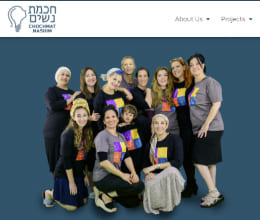Three women made headlines in the past week. Each was abused by her husband. One is dead. One nearly died. And the other is still chained to her abuser 30 years after she left him.
Diana Raz, z’l was shot dead in front of her children by her husband. She was 32 years old.
Shira Isakov was 31 when her husband stabbed and beat her nearly to death in front of her toddler.
Sarah (not her real name) was 30 when she left her husband after 10 years of abuse. She is now 60 and still waits for her freedom.
These women have been failed by the State of Israel twice. First, because the country never implemented the approved plan to fight domestic abuse. Second, because the state rabbinic courts not only sanction abuse, but participate in it.
In 2017, a NIS 250 million plan was approved to fight rising domestic abuse in Israel. This included increased social workers, anti-violence programs, additional police units to investigate abuse and more.
By the time the coronavirus pandemic hit in 2020, only NIS 50 million had been allocated. The pandemic and its accompanying lockdowns brought health concerns and economic woes, leading to a period of intense stress. As in the rest of the world, domestic violence increased in Israel, with a 30% rise in calls to hotlines across the country and overbooked women’s shelters.
Fay Sukenik of Ba’asher Telchi, which supports Haredi women through the divorce, process reports a 75% increase in calls seeking assistance this year – most due to incidents of violence. “Many women have lost their jobs or were put on unpaid leave and are dealing with their own fears as well as their children’s. Most calls have been for support and emergency assistance.” Her office is preparing for the expected increase in calls asking for help in the divorce process when lockdowns end.
Pnina Omer, director of Yad LaIsha, which represents women seeking divorce in the rabbinic courts, says her organization expects a significant rise in divorce cases as people go back to work and women are more free to call. Naavah Shafner of Mavoi Satum, which represents women denied a divorce by their husbands, expects the same.
The halachic (Jewish legal) aspects of ending marriage are too complex to delve into here (for more information listen to Chochmat Nashim’s podcasts and deeper discussions). Yet, it is important to note that because there is no civil divorce in Israel, every Jewish woman must go through rabbinic courts to end her marriage. Only men can give a divorce, and while the rabbinic courts have tools they can use – halachic and civil – to help a woman trapped in marriage, proof of abuse is not necessarily considered a valid reason for divorce. Indeed, women like Sarah have been sent back to their abusers against their wishes.
The phenomenon of thousands of Jewish women around the world trapped in marriage, awaiting their husbands’ willingness to provide a get, is a new one. They are not classical agunot, whose husbands have disappeared in war or while traveling. These women are mesuravot get – women whose husbands simply refuse to set them free.
The world has changed for women, and financial freedom means that being in a bad marriage is no longer preferable to being in no marriage. Yet, women are left trapped when the courts abet the abusers who keep them chained, refusing to use the tools at their disposal.
Let us be clear:
Denying someone her freedom is abuse. Anyone enabling that denial is a party to that abuse.
In addition to halachic tools, the state rabbinic courts have civil tools they can use to incentivize a man to release his wife. Invalidating a driver’s license, jail time, and shaming are all tools within their state-sanctioned toolbox – but most often, they lie unused beside the halachically oriented ones.
That is why when Shira, the woman whose husband all but killed her five months ago, received her get on Tuesday, February 10th, it was cause for celebration. There are others, women who have been nearly killed or abused for years, whose husbands are in jail for violence, and yet have not been ordered by the rabbinic court to divorce their wives.
The head judge in Shira’s case, Rabbi Edry, threatened to bring her husband in for daily hearings and throw him into solitary confinement (note that he is already in jail for her attempted murder). There is little doubt that the public’s interest in the case intensified the court’s willingness to use sanctions, and lit the fire under it to find a solution and get off the public’s radar. News that the woman who was nearly beaten to death could not get a divorce from her would-be murderer was, of course, everywhere – as were calls for the rabbis to take action to protect this woman.
The public saved Shira twice, first, when her neighbor heard her cries for help, and then when her story captured the nation’s outrage.
But Sarah has no champion. She sits and waits. 30 years after leaving her abuser, she is still chained to him in marriage. The rabbinic court has acceded to his every whim and request for reconciliation. And now, they’ve accepted his condition for her freedom. She must pay him the million shekels she won in family court that went to support their children over the past 30 years.
Jewish women routinely pay or surrender their rights for their freedom. Women give up child support, property, and even the right to charge their husbands with rape and assault – all with the approval of the state rabbinic courts.
Here, in the Jewish state, where Jews are supposed to be safe, Jewish women are not protected.
How can we work towards change?
Here are three things you can do today.
1 — Sign a halachic prenup. If you are already married, sign a post-nup. While there are different versions (listen here for more information), signing one can save your freedom. If you are a rabbi — don’t marry anyone without a halachic prenup. Want to host a pre/postnup party? Be in touch!
2 — Email your rabbi and shul board. Ask them to make prenups a part of the yearly programming. Ask them to speak about it, make it a normal part of communal life, and make your community prenup positive. It is impossible to know how many women you could be saving.
3 — Attend political parlor meetings. If you live in Israel, elections are coming! Ask party representatives what they plan to do to protect women. Ask them about implementing the budget and making halachic prenups a part of state marriages. Insist that they make women’s freedom and safety a priority.
Does a woman need to nearly die to earn her freedom in the Jewish state?
To live up to our values- Jewish and democratic – the answer must be,“NO!”


